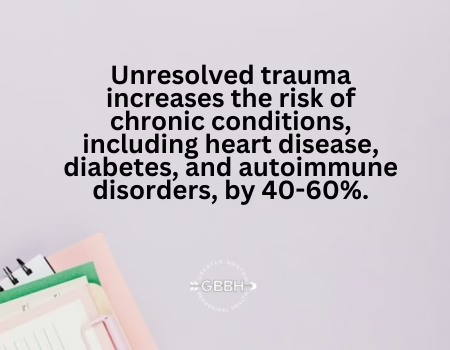Trauma, whether from a single overwhelming event or a prolonged period of stress, has profound effects on the mind and body. Its influence often lingers, manifesting in subtle and overt ways that shape how individuals perceive themselves, interact with others, and navigate the world. Unresolved trauma can echo in daily life, creating patterns of behavior, thought, and emotion that interfere with well-being and personal growth.
At Greater Boston Behavioral Health (GBBH), we specialize in helping individuals identify and heal from these echoes. Through comprehensive services like Trauma Therapy Programs, Partial Hospitalization Programs (PHP), and Intensive Outpatient Programs (IOP), we empower individuals to confront and process their trauma, creating pathways to lasting recovery. This blog delves into how unresolved trauma manifests, its effects on everyday life, and the therapeutic options available to help individuals reclaim their lives.
Understanding Trauma and Its Long-Term Impact
Trauma arises from events or experiences that overwhelm an individual’s ability to cope. These experiences can range from acute incidents, like accidents or assaults, to chronic situations, such as prolonged neglect, abuse, or living in unsafe environments. Trauma doesn’t just reside in memory; it embeds itself in the body, mind, and emotional responses.
Types of Trauma
- Acute Trauma: Resulting from a single, distressing event, such as an accident or natural disaster.
- Chronic Trauma: Stemming from prolonged exposure to distressing circumstances, such as abuse or bullying.
- Complex Trauma: Often originating in childhood, involving multiple, compounded traumatic experiences.
- Secondary or Vicarious Trauma: Experienced indirectly, such as by caregivers or first responders exposed to others’ trauma.
Unresolved trauma often becomes a hidden force in daily life, manifesting in ways that may be misinterpreted or overlooked.
How Unresolved Trauma Manifests in Everyday Life
Trauma’s echoes can appear in various aspects of life, often masquerading as unrelated challenges. Recognizing these manifestations is the first step toward healing.
1. Emotional Dysregulation
Trauma disrupts the brain’s ability to regulate emotions, leading to:
- Intense emotional reactions, such as anger or sadness, disproportionate to the situation.
- Difficulty calming down after being upset, requiring tools learned in an Anger Management Program.
- Emotional numbness, where individuals feel detached from their emotions and surroundings.
2. Chronic Anxiety and Hypervigilance
The lingering effects of trauma keep the nervous system in a constant state of alert. Symptoms include:
- Feeling on edge or easily startled.
- Difficulty concentrating or relaxing.
- Frequent intrusive thoughts or a sense of impending danger. Many individuals seek relief through an Anxiety Treatment Program to manage these symptoms.
3. Relationship Difficulties
Unresolved trauma can distort how individuals perceive and engage with others. Common challenges include:
- Fear of abandonment or rejection, leading to clinginess or avoidance.
- Struggles with trust and intimacy, even in close relationships.
- Cycles of conflict or withdrawal, which can be addressed through Family Therapy Programs.
4. Avoidance Behaviors
To shield themselves from triggers, individuals may engage in avoidance, such as:
- Avoiding places, people, or activities that remind them of the trauma.
- Shutting down emotionally to prevent painful memories from surfacing.
- Distracting themselves with work, social media, or substance use.
5. Self-Sabotaging Patterns
Trauma can lead to behaviors that undermine personal growth and well-being, including:
- Procrastination or perfectionism driven by fear of failure.
- Overcommitting to avoid sitting with difficult emotions.
- Engaging in risky behaviors or toxic relationships as a coping mechanism.
6. Physical Symptoms
The body holds the effects of trauma, often resulting in:
- Chronic pain or tension, such as headaches or back pain.
- Sleep disturbances, including insomnia or nightmares.
- Digestive issues or a weakened immune system.
7. Flashbacks and Dissociation
For individuals with PTSD, trauma can intrude into daily life through:
- Flashbacks, where they feel as though they are reliving the traumatic event.
- Dissociation, a sense of detachment from their body or reality, often as a protective mechanism.
The Long-Term Effects of Unresolved Trauma
Without intervention, trauma can take a significant toll on mental, emotional, and physical health:
- Mental Health Disorders: Conditions like depression, anxiety, and PTSD are common among those with unresolved trauma.
- Substance Use Disorders: Many individuals turn to substances to numb their pain or escape distressing memories.
- Physical Health Problems: Chronic stress from unresolved trauma increases the risk of heart disease, autoimmune conditions, and other serious illnesses.
- Social Isolation: Trauma often leads to withdrawal from relationships and activities, exacerbating loneliness and further entrenching symptoms.
Healing Trauma: Effective Treatment Approaches
The path to recovery from trauma is deeply personal, but it is also possible with the right tools and support. At GBBH, we offer a range of therapeutic approaches to help individuals process and heal from trauma.
1. Trauma Therapy Programs
Our Trauma Therapy Programs are designed to address the root causes of trauma through evidence-based techniques, including:
- Cognitive Behavioral Therapy (CBT): Helping individuals reframe negative thought patterns and develop healthier coping mechanisms.
- Eye Movement Desensitization and Reprocessing (EMDR): A specialized approach to reduce the emotional intensity of traumatic memories.
- Somatic Experiencing: Focusing on releasing trauma stored in the body.
2. Group Therapy Programs
Group therapy creates a sense of community and shared understanding, offering:
- Peer support and validation from those with similar experiences.
- Opportunities to learn from others’ coping strategies.
- A safe space to practice new skills.
3. Intensive Outpatient Programs (IOP)
IOPs provide structured, flexible care that allows individuals to address trauma while maintaining their daily responsibilities. These programs include:
- Individual and group therapy sessions.
- Skill-building workshops tailored to specific challenges.
4. Partial Hospitalization Programs (PHP)
For those needing more intensive care, our PHP offers:
- Daily therapeutic interventions.
- Close monitoring and support from experienced clinicians.
- A focus on stabilization and skill development.
5. Family Therapy Programs
Trauma often affects not only the individual but also their loved ones. Family Therapy Programs help:
- Foster open communication and understanding.
- Rebuild trust and strengthen relationships.
- Provide family members with tools to support the recovery process.
6. Anger Management Programs
Trauma can manifest as intense anger or frustration. Our Anger Management Programs teach participants:
- Techniques to manage and express anger constructively.
- Strategies to identify and address triggers.
Holistic Approaches to Healing
In addition to therapy, incorporating holistic practices can enhance recovery:
- Exercise: Physical activity reduces stress and improves mood by releasing endorphins.
- Mindfulness and Meditation: Grounding techniques help individuals stay present and manage triggers.
- Creative Outlets: Art, music, or writing provide safe ways to process emotions.
Why Choose Greater Boston Behavioral Health?
At Greater Boston Behavioral Health, we are dedicated to helping individuals heal from trauma and regain control of their lives. Here’s what makes us unique:
- Trauma-Informed Care: Our therapists are trained to create a safe, nonjudgmental space for healing.
- Comprehensive Services: From Trauma Therapy Programs to Group Therapy Programs, we offer a range of services tailored to individual needs.
- Flexible Treatment Options: Our PHP and IOP options provide varying levels of care to meet clients where they are in their recovery journey.
- Convenient Location: As a trusted Mental Health Treatment Center in Boston, we are committed to serving the community with accessible, high-quality care.
Conclusion
Unresolved trauma doesn’t have to control your life. With the right support, you can break free from its echoes and rediscover a sense of safety, purpose, and joy. At Greater Boston Behavioral Health, we are here to guide you every step of the way.
Contact us today at (888)278-0716 to learn more about our services, including Trauma Therapy Programs, Intensive Outpatient Programs, and Family Therapy Programs. Let us help you reclaim your life and achieve lasting wellness.
FAQ on Unresolved Trauma and Its Daily Impact
What is unresolved trauma?
Unresolved trauma refers to the lingering effects of traumatic experiences that have not been fully processed or addressed. It can impact emotional, mental, and physical well-being.
How does unresolved trauma affect daily life?
Trauma can manifest in emotional dysregulation, anxiety, relationship difficulties, physical symptoms, avoidance behaviors, and self-sabotaging patterns.
Can unresolved trauma lead to mental health disorders?
Yes, unresolved trauma is a common underlying cause of conditions like anxiety, depression, PTSD, and substance use disorders.
What treatment options are available for trauma?
Effective options include Trauma Therapy Programs, Intensive Outpatient Programs (IOP), Partial Hospitalization Programs (PHP), Group Therapy Programs, and Family Therapy Programs.
How does trauma therapy work?
Trauma therapy uses evidence-based approaches like Cognitive Behavioral Therapy (CBT), Eye Movement Desensitization and Reprocessing (EMDR), and mindfulness to process traumatic experiences and develop healthy coping mechanisms.
Can trauma therapy help my family?
Yes, Family Therapy Programs help loved ones understand trauma’s effects, improve communication, and rebuild trust within the family.


